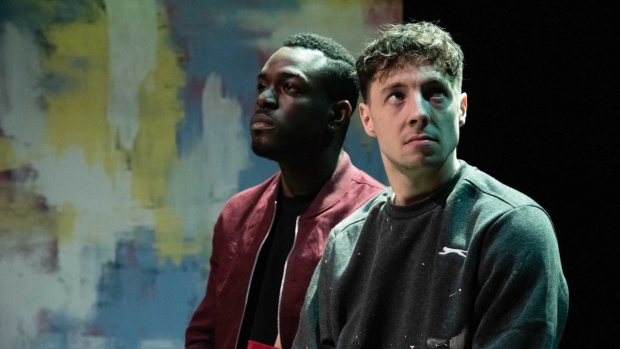Human Nurture at Crucible Studio Theatre – review
Ryan Calais Cameron’s drama is also visiting schools in the Sheffield area, ahead of a national tour

© Chris Saunders
Sheffield Theatres take a bold approach to the presentation of Ryan Calais Cameron's new play, Human Nurture, a co-production with Theatre Centre. From Thursday to Saturday for the next two weeks it will be staged in the Crucible's Studio Theatre; for the first part of the week the production belongs in Sheffield schools – and a national tour is to follow. Assuming that the school ethos is tolerant enough to cope with some industrial language, it seems an ideal choice for this hybrid existence.
The play has a telling message on racism, but couched in an initially entertaining format aimed directly at teens and twenties. The production is mobile, with its two actors, DJ and a set by Tara Usher which consists of panels with abstract designs and a platform made up of blocks that can turn into whatever's needed. The play runs a mere 55 minutes and Rob Watt's direction is dynamic, fast-moving and full of action and contrasts.
The essence of the plot is simplicity itself. Harry (white) and Roger (Black) were in care together, best buddies, sharing everything. Roger was adopted by a white family and his trajectory has been upward. He has moved away, but returns for Harry's birthday. Gradually it emerges that two things have happened: Harry has become involved with racists and is responsible for offensive posts on social media; Roger has embraced Africa and is now known as Runaku. They argue; their friendship ends.
It is, of course, subtler than that bare plot outline suggests. It confronts, for instance, the old and oft-repeated question, "How can I be a racist if my best friend is Black?". Dovetailing with that is Runaku's powerful recall of the first time he became aware of his Blackness, the first time he heard what I must call the ‘N' word – Runaku has no such inhibition. Friendships make their own rules, but Harry and Runaku look on the world in general through different eyes. For instance, Harry is oddly shocked that Runaku is attracted to a girl from Gabon – Black, of course. Runaku realises that the only place where the two are safe together is in their memories.
It's admirable that young audiences are confronted by the complexities of racism, but it's also admirable that Cameron and Watt entertain them and help them to identify with the characters in a first 20 minutes or so full of acrobatic action, high fives, shared jokes, high-octane narration and chorusing the punch-lines to each other's stories. All this – and also some of the more dramatic moments – are boosted by Neeta Sarl's live performance of her music: electronics, keyboard and percussion programmed together.
Apart from the running, leaping and general athleticism, Lucas Button (Harry) and Justice Ritchie (Runaku), have plenty to say on behalf of their characters. Harry is the voice of underprivileged white youth, Button's eyes shifting uncertainly and suspiciously at any departure from the norm. Ritchie has quiet intensity and, ultimately, dignity, while exploding at key moments, notably when happy crazy memories (their safe place) lead suddenly to the realisation of his otherness.
Human Nurture has enough substance to stand up as a theatre presentation, but it is probably most rewarding in a school context, no doubt followed by a discussion where white urban youths and Black teenagers torn between integration and ancestry tease out the lessons to be learned.












